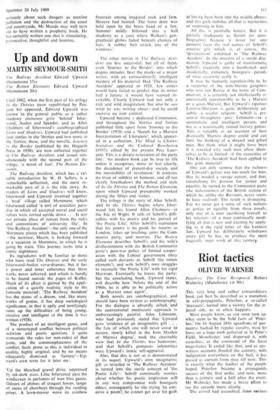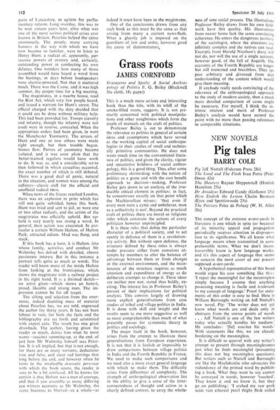Riot tactics
OLIVER WARNER
Peterloo: The Case Re-opened Robert Walmsley (Manchester up 90s)
This very long and rather extraordinary book can best be described as a marathon in anti-propaganda. Peterloo, a so-called 'massacre', turned into a victory for the in- jured side, as so often happens.
Most people know, or can soon turn up. what seem to be the bald facts of 'Peter- too.' On 16 August 1816 squadrons of yeo- manry, backed by regular cavalry, were let loose on a huge mob gathered in St Peter's Field, Manchester, and dispersed it, with casualties, at the command of the local magistrates. It ended like that, and as eye- witness accounts flooded the country, with indignation everywhere on the boil, it has passed as current from then till now... This is exactly what the leaders of the people hoped. Peterloo became a propaganda success of the first order, and now, more than a century and a half after the event. Mr Walmsley has made a brave effort to see the episode more clearly.
The crowd had assembled, from various parts of Lancashire, to agitate for parlia- mentary reform. Long overdue, this was to be won sixteen years later, after what was one of the most serious political crises ever known in Britain. Peterloo helped the cause enormously. The people, many carrying banners in the way with which we have now become so familiar, were to listen to Henry Hunt, a radical of, apparently, per- suasive powers of oratory and, certainly, outstanding power in conducting his own defence. One wonders how many of those assembled would have heard a word from the hustings, in days before loudspeakers were electric-powered. Not that it mattered much. There was the Cause, and it was high summer, the proper time for a big meeting.
The magistrates, in a nearby house, read the Riot Act, which very few people heard, and issued a warrant for Hunt's arrest. The official charged with the duty decided that it could not be done without military help. This had been provided for. Troops (cavalry and infantry, though the infantry were not used) were in reserve, concealed. When the appropriate orders had been given, in went the Manchester Yeomanry. The arrests of Hunt and one or two others were made right enough, but then trouble began. Stones flew. Parties of yeomanry became isolated, and it was soon plain that the better-trained regulars would have work to do. It was so, and a considerable set-to then followed in which casualties occurred, the exact number of which is still debated. There was a good deal of panic, natural in the situation, and women were among the sufferers—classic stuff for the official and unofficial radical PROS.
When news of the fracas reached London, there was an explosion in print which has still not quite subsided, hence this book. Hunt was tried and sent to jail, so were one or two other radicals, and the action of the magistrates was officially upheld. But up- held is very nearly too strong a word. In general, their action was execrated. In par- ticular a certain William Hulton, of Hulton Park, attracted odium. Mud was flung, and stuck.
If this book has a hero, it is Hulton, into whose family, activities and conduct Mr Walmsley has delved with detailed, almost passionate interest. But in this instance a portrait tells quite as much as words. The reader will know more of the inside Hulton from looking at the frontispiece, which shows the magistrate with a railway project in his right hand. It is a finished sketch— no artist given—which shows an honest, proud, likeable and strong man. The im- pression cannot be far off target.
The sifting and selection from the enor- mous, indeed daunting mass of material about Peterloo has, we are told, engrossed the author for thirty years. It has not been labour in vain, for both the facts and the bibliography are set forth and scrutinised with expert care. The result has one great drawback. The author, having given the reader so much, denies him what he most wants—succinct summing-up, at the end, of just how Mr Walmsley himself sees Peter- loo. It is all implied, but that is not enough, for there are so many versions, deductions true and false, and sheer red herrings that long before the end, and however often he turns to the invaluable dramatis personae with which the book opens, the reader is sure to be a bit confused. All he knows for certain is that Hulton was a man of courage, and that if you assemble as many differing eye witness accounts as Mr Walmsley, the scene becomes as blurred—as a whole—as indeed it must have been to the magistrates.
One of the conclusions drawn from any such book as this must be the same as that arising from many a current news-flash. What a ghastly job is imposed on the guardians of law and order, however good the cause of demonstrators,



































 Previous page
Previous page